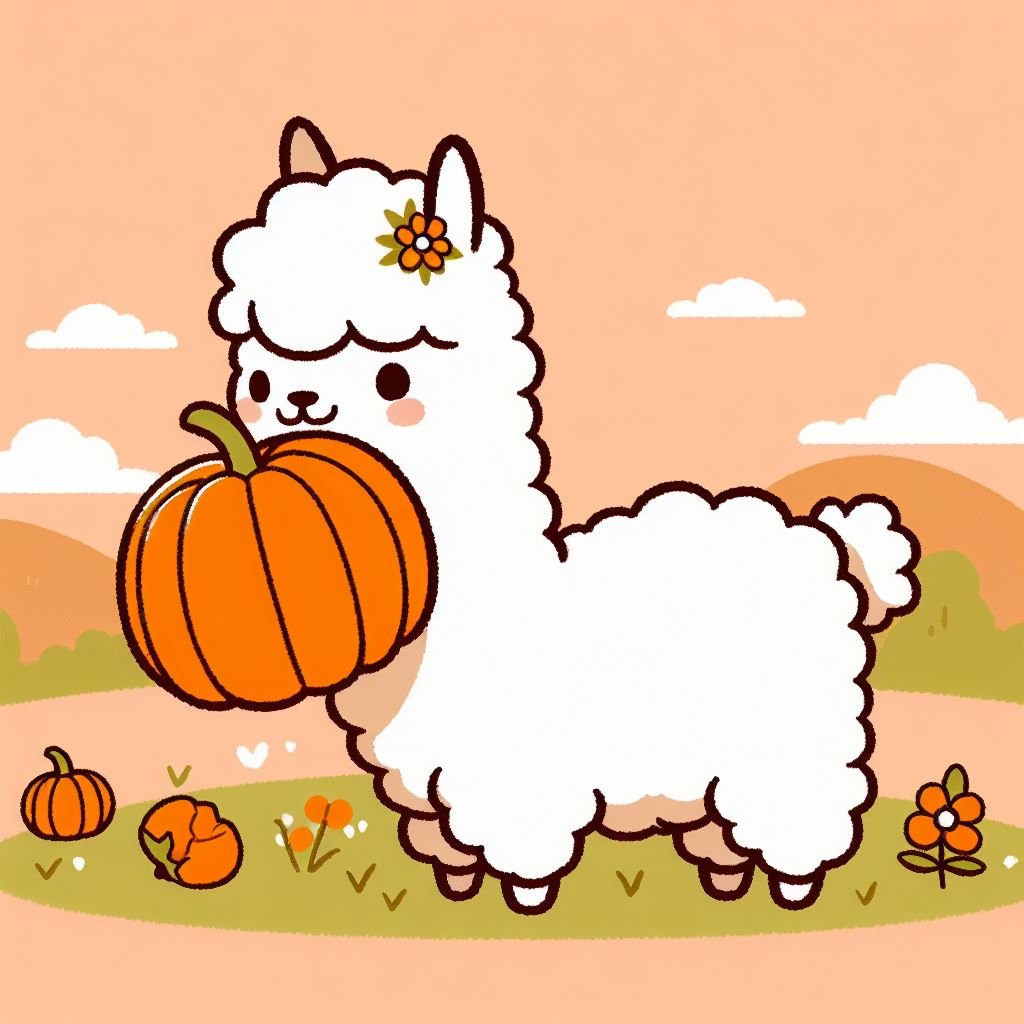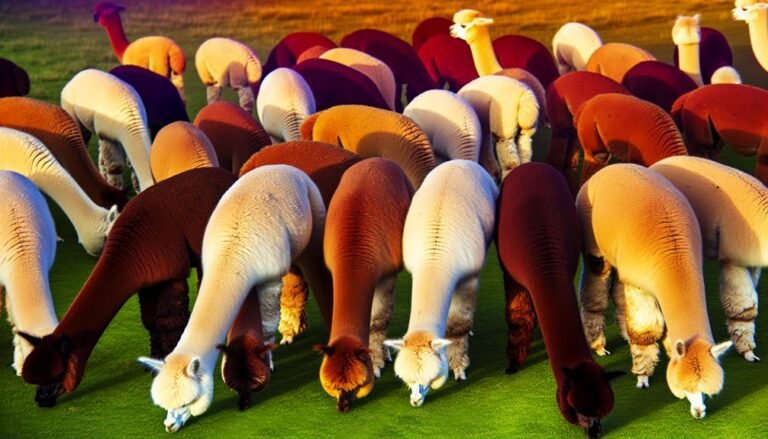Can Alpacas Eat Pumpkins?
Ever found yourself wondering, “Do alpacas eat pumpkins?” You’re not alone. It’s a question that’s crossed the minds of many alpaca owners and enthusiasts.
Alpacas, with their fluffy coats and curious eyes, are fascinating creatures. Their dietary habits are just as intriguing. Let’s delve into the world of alpacas and pumpkins, and uncover the truth.
In this article, I’ll shed light on the dietary preferences of alpacas, specifically their affinity (or lack thereof) for pumpkins. It’s time to unravel this mystery and satisfy our curiosity once and for all.
Key Takeaways
- Alpacas, originating from South America, are pseudo-ruminants with a unique dietary preference primarily consisting of fiber-rich grasses, leaves, wood, bark, and stems. Their adaptable digestion allows them to thrive on diverse diets.
- Aside from their standard diet, alpacas occasionally show a liking for fruits, vegetables, and surprisingly, pumpkins. This preference for pumpkins is not harmful but rather beneficial, adding nutritional diversity.
- Pumpkins are not a regular part of alpaca diet, but they are known to be eaten when available. Alpaca owners frequently observe them consuming pumpkins during the fall season.
- The consumption of pumpkins by alpacas is beneficial due to the nutritional content of pumpkins which includes low calories, high water content, and essential vitamins like Vitamin A, Vitamin C, and Vitamin E.
- Pumpkins, despite their nutrition benefits, should only be offered as a treat or supplement, rather than a primary food source. Overindulgence can disturb their dietary balance.
- The variety in an alpaca’s diet, ranging from grass to pumpkins, signifies their incredible adaptability and underlines the diverse food choices nature offers these fascinating creatures.
The World of Alpacas
The intriguing world of alpacas is full of surprises. Originating from South America, these fascinating creatures were once considered royal pets in the ancient Incan civilization. Today, they’re popular for their premium wool, adorable demeanor, and unique dietary preferences.

Alpacas belong to the Camelidae family, which also includes camels and llamas. An interesting fact about the alpaca diet is that they are pseudo-ruminants. Unlike the true ruminants that have four stomach compartments, alpacas only have three. But, they’re still able to extract maximum nutrients from plant-based diets, much like cows and goats.
These gentle animals have a reputation for being selective eaters. Primarily grass eaters, alpacas also feed on leaves, wood, bark, and stems. Given their high fiber diet, alpacas are able to thrive in harsh landscapes where other herbivores would struggle. Their eating habits and digestive system make them remarkably resilient, enabling them to withstand severe weather changes and poor quality vegetation.
Beyond their standard dietary choices, alpacas can sometimes show a liking for more unconventional foods – fruits, vegetables and yes, occasionally pumpkins to satisfy their nutritional requirements. It piques curiosity, doesn’t it? What drives these interesting eating habits?
As we delve deeper into the world of alpacas, let’s explore their affinity towards pumpkins. Rebels of the camelid family or a testament to their adaptable natures? Stay tuned as I unravel more about this intriguing facet of alpaca life in the ensuing sections.
Alpaca Dietary Preferences
Delving deep into the world of alpacas, I’ve uncovered some remarkable facts about their unique dietary preferences. It’s important to note, alpacas are pseudo-ruminants. This categorization distinguishes them from full ruminants like cows and sheep. Equipped with three compartment stomachs, alpacas have a fascinating digestive system designed to extract the most nutrients from their diet.
Eminently, the primary food of alpacas is grass. Unfazed by the variety, they can consume almost any grass type. Their adaptive digestion allows them to break down tough, fibrous plant material, which wouldn’t be easily digested by many other animals. So it’s not surprising to see them munching on leaves, wood, bark, and stems when pasture grass is scarce.
Alpacas, hailing from South America’s harsh landscapes, have evolved to survive on sparse foliage, which implies their high fiber diet. Yet, their dietary habits reveal occasional delving into unconventional foods, adding to their menu diversity. This course would typically encompass fruits and vegetables.
I have even observed an interesting trend among some alpacas, a certain proclivity towards pumpkins. Yes, pumpkins! A strange choice, one might think, but it’s exactly these odd delicacies that form a striking aspect of alpacas’ existence.
Exploring Alpacas and Pumpkins
Diving into the world of alpacas and their dietary choices, I’ve often come across some intriguing facts. One thing that sets apart alpacas is their fondness for pumpkins. It’s a sight that is as surprising as it is heartwarming.
It’s worth noting that pumpkins are not part of alpacas’ regular diet. However, when presented with the opportunity, alpacas have been known to partake in this vegetal delicacy. Bemused alpaca owners and breeders have reported instances where their alpacas seem to enjoy munching on pumpkins, particularly during the fall season, when pumpkins are abundant.
This unusual preference is not harmful, as pumpkins are low in calories, have high water content and are packed with nutrients beneficial to alpacas. Moreover, the outer skin of a pumpkin requires some chewing, helping alpacas keep their constantly growing teeth in check.
It’s worth mentioning that, while alpacas have a remarkable ability to handle a diverse range of feeding options, moderation is key. Overindulgence in any type of unconventional food, including pumpkins, can disturb their dietary balance. Therefore, pumpkins should only be offered as an occasional treat or supplement, rather than a primary food source.
The world of alpacas and their dietary preferences is as fascinating as it is diverse. It’s a testament to their ability to adapt, survive and thrive in diverse environments. From grass to pumpkins, the alpaca diet underscores the incredible variety of food nature has to offer. As we continue delving into this topic, let’s move past pumpkins and explore what else these wondrous creatures have in their menu repertoire.
Do Alpacas Eat Pumpkins?
Here’s something you may not anticipate on your probes into the world of alpacas. A resounding yes, alpacas do eat pumpkins! They are not staple food items in an alpaca’s diet, but these adorable creatures show a strong liking for this orange delight, particularly when fall rolls around and pumpkins become plentiful.
What makes pumpkins a preferred occasional treat? Well, pumpkins are low in calories which is good for an alpaca’s waistline. They also have a high water content. Alpacas, like us humans, need to stay hydrated for overall health, and a juicy pumpkin can help with that.
The nutritional profile of pumpkins is impressive. They’re packed with vitamins beneficial to alpacas such as vitamin A powerful for vision and immune health, vitamin C, a reliable antioxidant, and vitamin E important for skin health. However, it’s important to remember that these nutrients should come from a variety of sources, not just pumpkins, to ensure a rich and balanced diet.
Also, let’s not forget about the outer skin of a pumpkin. The firm exterior requires some good chewing, which helps alpacas keep their teeth in check. Plus, exploring different textures can be fun for these curious creatures.
Table 1: Nutritional benefits of pumpkins for alpacas
| Nutrient | Benefit |
|---|---|
| Low calories | Good for maintaining weight |
| High water content | Helps with hydration |
| Vitamins A, C, E | Contributes to immune health, antioxidant activity & skin health |
However, the keyword here is moderation. Pumpkins should form just a fraction of an alpaca’s diet, they must not substitute main feed like alpaca pellets or hay. Pumpkin intake should be monitored carefully to avoid any negatives such as excessive sugar levels.
In the grand scheme, pumpkins show the incredible adaptability of alpacas. They remind us of the large variety of food nature offers to these creatures, perfect for satisfying their taste buds and maintaining their health at the same time.








Our picks
Alpaca & Wool Felted Sole Inserts: Comfy Upgrade?
Best Alpaca Socks for Hiking: Ultimate Comfort and Durability on Trails
Best Alpaca Halter for Comfort and Control